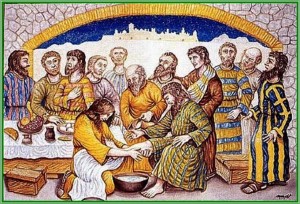Recently there have been further issues in the Irish Church, with another report on a diocese there, in regards to safe-guarding issues. There is no need, here, to enter into the momentous developments in Ireland, between Church and State, for they have been well documented recently. For the purpose of this short reflection, two different Irish priests – both living there – have said to me, that those in authority in the Church, do not have much vision about the future, and therefore have not been able to react, in an appropriate way – a way that gives credibility, in these often confusing times, and that this has led to vociferous attacks against the Church authorities.
 |
A Shepherd Leading His Sheep
This idea of vision, in our confusing times for the Church, has been something that has exercised my mind, as well. There is a certain responsibility, for the small part of the Church, in which others, and I, have a certain responsibility. For me, this would mean the Parish of St. Mary’s, Leyland, the monastery of Ampleforth, the Archdiocese of Liverpool – and, of course, all other aspects of Church that touch on my life. Clearly, the Church is what is of the greatest interest here, for fundamentally, it is nothing less than the continuing presence of the Risen Christ, in our world.
 |
Jesus at the Last Supper
Yes! These are confusing times! We do need help in formulating an appropriate vision, for the present, and for the future of the Church; without that help, who would have the wisdom, or the ability to understand, comprehensively, the many complex strands, the many complex movements, systems and structures involved?
For one thing, there are many diverse and strongly felt opinions. There are those who find ‘communion, community, the Holy Spirit guiding us, openness and dialogue with others’ as the way ahead. The Vatican Council certainly promoted these ideas, and they are enshrined in the theological, and spiritual, principles contained in the notion of ‘communion, fellowship, (‘koinonia, in Greek)’, that is present in the Vatican Council, and in Church documents covering the past forty years.
Others think the Church has been ‘led astray’ by the Vatican Council, and that we must develop ‘devotions, have a separate Catholic traditional culture, lead others to the one truth that we possess, become distinct and Catholic and let others come to us. Dialogue with others is a betrayal of what being Catholic is!’ This attitude, or way of thinking, is growing in the Church at present, and its argument can be ‘backed up’ by statements even from the Vatican Council – and from other Church documents.
Within all this there are other strands that complicate the issue. An obvious one is our own sinfulness, and inadequacy, whichever way we think! Another is uncertainty, about how to respond to the behaviour of people, with whom we are closely involved, that goes against traditional Catholic teaching. Another is concerned with the rules and regulations of the Church, and the possibility of using an interpretation of these rules, in a way that suits our own way of thinking and thus allows us to go our own way. Then, there are issues of government and state that impinge on our beliefs and practices. There are, also, the perennial, and universal, foundation stones of a Catholic Christian — the search for God or holiness — the place of prayer in our lives — and the Sacramental life by which we remain in close union with God, especially the Mass and frequent Holy Communion — the challenge of loving our neighbours — the over-riding challenge of the relative wealth which we enjoy in Britain as a whole, compared with the utter destitution of such a large percentage of our fellow human beings, throughout the world.
Where then do we find Vision? Please do not expect a clear answer in these few lines. Rather it may help to share a direction of thought and some experience. Here, I make some short points.
- If we are to have a vision, it is precisely WE who need it; it needs to be something shared. It is a very slow business to gain the confidence of many, but it took centuries for Christianity to be absorbed, and some argue that we do not yet follow the full implications of the Gospel.
- People are very conservative, and do not like change that affects their personal beliefs, this despite the paradoxical fact we live in fast changing times. People have often said that, in superficial ways, people think and behave, in 2011, differently to the way people did as recently as 2009, but, when it comes to changing behaviour, in tune with Gospel values, we are slow to change – in any profound way – our personal habits.
- A vision needs to affect us in practical ways, and needs to be, in ‘tune’, with the way Jesus behaved. Such a vision would not be acceptable if people felt dominated, or led, in directions they do not want to go.
- Those who propose such a vision, need to be authentic, in their own personal lives. Furthermore, they need to stick to the vision that God has given to them, and believe in it, despite human frailty, weakness and disappointment. Part and parcel of such a vision would be a developed sense of mercy, and forgiveness, both of us and of others.
 |
Cutting the Cake at My 40th Anniversary Celebrations
Recognising some truth in the above, it may still be possible to find a simple formula, under which to proceed. One that comes to mind is ‘Helping the Church to be the place where people feel at home!’ We all need to belong, to love and be loved, and would not that provide a possible ‘vision’? Of course such an approach would be ‘generic’, and would have many different expressions, in the local context, but that again, would be a part of a future vision: let the local become something alive’ and distinct’ in each different situation.
Here there may be something to think about, and, perhaps, such ideas might help those in high authority within the Church, to know how to react, and support people when the Church we love is attacked; this may be so, even though it may be to the good that such attacks happen, should it be that Church people have seriously failed others!
In e-mailing the blog, ‘Word Press’ tends to distort the original formatting of the document. Readers may wish to visit the website www.stmarysblog.co.uk to read it in its original format.
